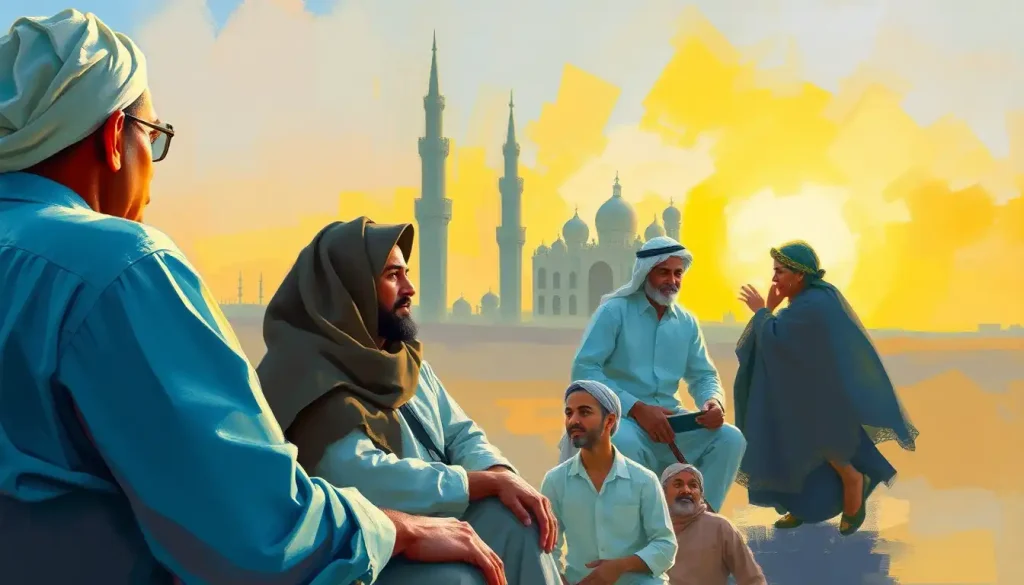From vast gold reserves beneath its soil to pioneering tech startups in Accra, West Africa’s economic powerhouse stands at the crossroads of tradition and transformation, offering a masterclass in how natural wealth can fuel a nation’s rise. Ghana, a country steeped in history and brimming with potential, has emerged as a beacon of economic progress in the region. Its journey from a colonial outpost to a vibrant, independent nation has been marked by both triumphs and challenges, shaping a unique economic landscape that continues to evolve.
Ghana’s economic story is one of resilience and adaptation. Since gaining independence in 1957, the country has weathered political upheavals, economic crises, and global market fluctuations. Yet, it has consistently bounced back, demonstrating a remarkable ability to reinvent itself and capitalize on its abundant natural resources and human capital.
Today, Ghana stands tall among its African peers, boasting a diverse economy that spans traditional sectors like agriculture and mining to cutting-edge industries in technology and finance. The country’s GDP growth has been impressive, averaging around 7% annually in the years leading up to the global pandemic. This robust performance has positioned Ghana as one of the fastest-growing economies in Africa, attracting attention from investors and policymakers alike.
But what exactly fuels Ghana’s economic engine? Let’s delve deeper into the various facets of this West African nation’s wealth and explore the opportunities and challenges that lie ahead.
Natural Resources: The Golden Foundation of Ghana’s Wealth
At the heart of Ghana’s economic prowess lies its abundant natural resources, with gold shining brightest among them. The country’s gold mining industry has been a cornerstone of its economy for centuries, earning it the colonial-era moniker “Gold Coast.” Today, Ghana ranks as one of the world’s top gold producers, with the precious metal accounting for a significant portion of its export earnings.
The gold mining sector in Ghana is a blend of large-scale operations run by multinational corporations and small-scale artisanal mining. This diversity has created a robust industry that provides employment for thousands and contributes substantially to government revenues. However, it’s not without its challenges. Environmental concerns and the need for sustainable mining practices are increasingly coming to the fore, prompting discussions about the future of this vital industry.
But Ghana’s natural wealth extends beyond gold. The discovery of offshore oil reserves in 2007 ushered in a new era for the country’s economy. The subsequent development of the oil and gas sector has provided a significant boost to Ghana’s GDP and export earnings. While this newfound resource has been a boon, it has also brought challenges, including managing the expectations of rapid development and avoiding the pitfalls of the “resource curse” that has plagued other oil-rich nations.
Another jewel in Ghana’s crown of natural resources is its cocoa industry. As the world’s second-largest cocoa producer, Ghana has long been a key player in the global chocolate market. The cocoa sector employs millions of Ghanaians, primarily small-scale farmers, and contributes significantly to the country’s foreign exchange earnings. However, like many agricultural commodities, cocoa faces challenges such as price volatility and the need for sustainable farming practices.
Beyond gold, oil, and cocoa, Ghana boasts a diverse portfolio of mineral resources, including diamonds, bauxite, and manganese. These resources, while not as prominent as gold, play crucial roles in diversifying the country’s export base and attracting foreign investment.
Economic Sectors: A Tapestry of Tradition and Innovation
While natural resources form the bedrock of Ghana’s wealth, the country’s economic landscape is far from monolithic. A diverse array of sectors contributes to its economic vitality, each playing a unique role in shaping the nation’s future.
Agriculture remains a crucial sector, employing a significant portion of the population and contributing substantially to GDP. Beyond cocoa, Ghana produces a variety of crops, including yams, cassava, and fruits. The government has been pushing for modernization and mechanization in agriculture, recognizing its potential to drive rural development and ensure food security.
The manufacturing sector, while still developing, has shown promise in recent years. Ghana has been making strides in value-added industries, particularly in agro-processing and light manufacturing. The government’s “One District, One Factory” initiative aims to accelerate industrialization by promoting the establishment of factories across the country.
Perhaps the most dynamic sector in Ghana’s economy is services. From banking and telecommunications to tourism and hospitality, the services sector has been a key driver of growth and employment. Accra, the capital city, has emerged as a regional hub for finance and business services, attracting multinational corporations and fostering a growing middle class.
One of the most exciting developments in Ghana’s economic landscape is the burgeoning technology and innovation sector. Nigeria’s Wealth: Unveiling the Economic Potential of Africa’s Giant may be more well-known, but Ghana is quickly making a name for itself in the tech world. Accra has become a hotspot for startups and tech entrepreneurs, with initiatives like the Ghana Innovation Hub fostering a vibrant ecosystem of innovation.
Foreign Investment and International Trade: Ghana’s Global Connections
Ghana’s economic growth story is intrinsically linked to its engagement with the global economy. The country has actively courted foreign direct investment (FDI), recognizing its potential to bring in capital, technology, and expertise. In recent years, Ghana has consistently ranked among the top FDI destinations in West Africa, attracting investments in sectors ranging from energy and mining to manufacturing and services.
The country’s stable political environment, relatively well-developed infrastructure, and business-friendly policies have been key factors in attracting foreign investors. However, challenges remain, including bureaucratic hurdles and infrastructure gaps that the government is working to address.
On the international trade front, Ghana has positioned itself as an export-oriented economy. Its major trading partners span the globe, including China, the United States, and European Union countries. The country’s exports are dominated by commodities like gold, cocoa, and oil, but efforts are underway to diversify the export base and move up the value chain.
Ghana’s participation in regional economic integration initiatives, such as the Economic Community of West African States (ECOWAS) and the African Continental Free Trade Area (AfCFTA), has opened up new opportunities for trade and investment. These initiatives have the potential to transform Ghana into a regional economic hub, leveraging its strategic location and relatively developed infrastructure.
Challenges in Wealth Distribution and Economic Growth
Despite its impressive economic growth, Ghana faces significant challenges in ensuring that the benefits of this wealth are equitably distributed. Income inequality remains a pressing issue, with a stark divide between urban and rural areas. While cities like Accra and Kumasi have seen rapid development and a growing middle class, many rural areas still grapple with poverty and lack of access to basic services.
Poverty rates, while declining, remain a concern. According to the World Bank, about 23% of Ghana’s population lived below the national poverty line as of 2016. The government has implemented various poverty reduction strategies, including social protection programs and initiatives to boost rural development. However, more needs to be done to address the root causes of poverty and create sustainable pathways out of it.
Infrastructure development is another critical challenge. While Ghana has made significant strides in areas like road construction and electrification, there are still substantial gaps, particularly in rural areas. Improving infrastructure is crucial not only for enhancing the quality of life for Ghanaians but also for boosting economic productivity and attracting investment.
Education and skill development represent both a challenge and an opportunity for Ghana. The country has made impressive progress in expanding access to education, but issues of quality and relevance to the job market persist. Addressing these challenges is crucial for preparing Ghana’s workforce for the jobs of the future and driving innovation-led growth.
Future Prospects: Ghana’s Path to Sustainable Wealth
Looking ahead, Ghana’s economic future appears bright, albeit with challenges that need to be addressed. The government has outlined ambitious plans for economic growth and development, including initiatives to boost industrialization, promote entrepreneurship, and leverage technology for development.
One area of focus is the development of emerging industries that can diversify the economy and create high-value jobs. These include sectors like information and communication technology, renewable energy, and high-value agriculture. The government’s “Ghana Beyond Aid” agenda aims to reduce dependency on foreign assistance and build a self-reliant, export-oriented economy.
Sustainability is increasingly becoming a key consideration in Ghana’s development plans. The country has committed to the United Nations Sustainable Development Goals (SDGs) and is working to integrate these goals into its national development strategies. This includes efforts to promote sustainable resource management, combat climate change, and ensure inclusive growth.
Regional economic integration presents another avenue for Ghana’s future growth. As the host of the AfCFTA secretariat, Ghana is well-positioned to play a leading role in driving intra-African trade and economic cooperation. This could open up new markets for Ghanaian businesses and attract investment in sectors like logistics and manufacturing.
Conclusion: Ghana’s Economic Odyssey
Ghana’s economic journey is a testament to the power of natural resources, human capital, and strategic vision in driving a nation’s development. From its roots as a gold-rich colony to its current status as a diversified, growing economy, Ghana has demonstrated remarkable resilience and adaptability.
Today, Ghana stands at a crucial juncture. It has the potential to leverage its natural wealth, human capital, and strategic location to become a true economic powerhouse in Africa. However, realizing this potential will require addressing persistent challenges such as income inequality, infrastructure gaps, and the need for economic diversification.
As we look to the future, Ghana’s path to sustainable wealth creation lies in its ability to balance the exploitation of its natural resources with investments in human capital and innovation. By fostering a vibrant entrepreneurial ecosystem, promoting sustainable development, and leveraging regional integration, Ghana can build on its current successes and create a more prosperous future for all its citizens.
The story of Ghana’s wealth is still being written, and the coming chapters promise to be as exciting as they are crucial for the country’s future. As Ghana navigates the complexities of the global economy and its own development challenges, it offers valuable lessons for other developing nations. In many ways, Ghana’s journey mirrors the broader story of Wealth in Africa: Unveiling the Continent’s Economic Potential and Challenges, showcasing both the immense potential and the persistent hurdles that characterize the continent’s economic landscape.
From the gold mines of Obuasi to the tech hubs of Accra, from the cocoa farms of the Western Region to the oil fields off the coast, Ghana’s diverse economic tapestry continues to evolve. As it does, it weaves a narrative of hope, resilience, and the transformative power of harnessing a nation’s natural and human resources for the greater good.
The road ahead for Ghana is not without its challenges. Issues such as environmental sustainability, particularly in the extractive industries, need to be addressed. The country must also grapple with the implications of climate change on its agriculture sector and coastal regions. Moreover, as Ghana continues to develop, it will need to navigate the complexities of urbanization, ensuring that its cities grow in a sustainable and inclusive manner.
Education will play a pivotal role in Ghana’s future. While the country has made significant strides in improving access to education, the focus now needs to shift towards quality and relevance. Developing a skilled workforce capable of driving innovation and competing in the global knowledge economy will be crucial for Ghana’s long-term economic success.
The tech sector, in particular, holds immense promise. Ghana’s burgeoning startup ecosystem, centered in Accra but spreading to other urban centers, is fostering a new generation of entrepreneurs. These innovators are not just creating jobs but are also developing solutions to local challenges in areas such as financial inclusion, healthcare, and agriculture. Supporting this ecosystem through policies, funding, and infrastructure will be key to unlocking its full potential.
Ghana’s experience also offers insights into the broader narrative of economic development in Africa. While each country’s journey is unique, Ghana’s successes and challenges provide valuable lessons for other African nations seeking to harness their natural resources and human capital for sustainable development. As we explore African Countries by Wealth: Exploring Economic Diversity Across the Continent, Ghana’s story stands out as one of cautious optimism and steady progress.
In conclusion, Ghana’s wealth is not just about the gold in its soil or the oil in its waters. It’s about the resilience of its people, the vibrancy of its culture, and the vision of its leaders. As Ghana continues to navigate the complexities of the global economy and its own development path, it stands as a beacon of possibility in West Africa and beyond. The country’s journey from the “Gold Coast” to a diversified, forward-looking economy is far from over, but the foundations for a prosperous future have been laid. With continued focus on sustainable development, inclusive growth, and innovation, Ghana is well-positioned to write the next chapter in its economic success story.
References:
1. World Bank. (2021). Ghana Overview. Retrieved from https://www.worldbank.org/en/country/ghana/overview
2. Ghana Statistical Service. (2021). Ghana Living Standards Survey (GLSS) 7 Main Report.
3. International Monetary Fund. (2021). Ghana: Staff Report for the 2021 Article IV Consultation.
4. Oxford Business Group. (2020). The Report: Ghana 2020.
5. African Development Bank. (2021). Ghana Economic Outlook. Retrieved from https://www.afdb.org/en/countries/west-africa/ghana/ghana-economic-outlook
6. UNCTAD. (2020). World Investment Report 2020: International Production Beyond the Pandemic.
7. Government of Ghana. (2019). Ghana Beyond Aid Charter and Strategy Document.
8. World Cocoa Foundation. (2021). Cocoa & Forests Initiative: Ghana 2020 Annual Report.
9. Ghana Investment Promotion Centre. (2021). Quarterly Investment Report.
10. World Economic Forum. (2020). The Global Competitiveness Report 2020.












Would you like to add any comments? (optional)